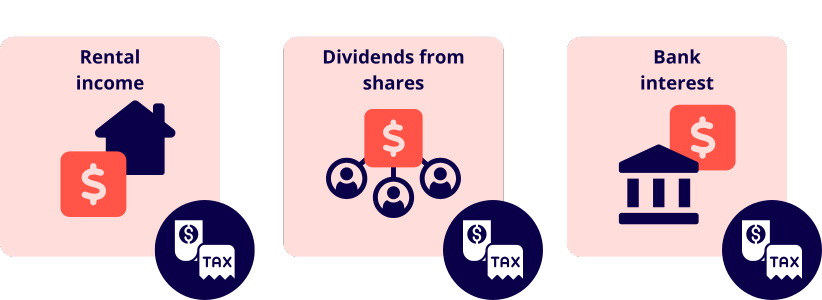TABLE OF CONTENTS
There’s no inheritance tax in Australia, which essentially means that beneficiaries don’t have to pay tax when they inherit assets from a deceased estate. However, that’s not to say that inherited assets are entirely free from tax obligations. Depending on how the assets are managed, sold or used, you might still be liable for capital gains tax (CGT), income tax or a variety of other financial responsibilities.
To help make sense of all the complexities, let’s take a closer look at the tax implications of inheriting assets in Australia, including superannuation death benefits and how capital gains tax plays a part.
Is there an inheritance tax in Australia?
Unlike lots of other countries around the world, Australia doesn’t impose an inheritance or estate tax. This means that when a person (i.e. beneficiary) inherits money, property or investments, they won’t need to pay tax on the value of those assets at the time they receive the inheritance. But be aware that this doesn’t mean the assets are completely exempt from all tax obligations.
Inherited assets can still be subject to capital gains tax (CGT) or income tax, as well as other estate taxes depending on how they are handled after the fact. You’ll want to familiarise yourself with all the potential liabilities so that you can comply with Australian tax law.
Capital gains tax on inherited property
Here are the circumstances around when capital gains tax might be payable (or not payable) on inherited property:
- If the deceased acquired the property before 20 September 1985: The property is generally CGT-free, as it predates CGT laws.
- If the deceased acquired the property after 20 September 1985: The cost base (purchase price plus expenses) of the property is inherited by the beneficiary. CGT is payable on any capital gain made when the property is later sold.
- If the property was the deceased’s main residence: Beneficiaries might be able to qualify for the main residence exemption. In other words, you won’t need to pay capital gains tax if you sell the property within two years of the deceased’s death (which is determined from the settlement date).
Here’s an example: if a deceased person owned a rental property that had appreciated in value, the beneficiary will need to pay CGT upon selling it. It’s a good idea to get professional advice from a financial advisor or tax law professional to figure out the best tax strategy for your circumstances.
Receiving income from an inherited estate

While inheritance tax in Australia doesn’t apply to the direct transfer of assets, income derived from those assets can still be – and generally is – subject to income tax. This might come in the form of:
- Rental income: If a beneficiary inherits property and rents it out, any rental income received must be reported in their tax return and is taxed at their marginal income tax rate.
- Dividends from shares: If the deceased left company shares, then any income generated via dividends must be included as taxable income derived.
- Bank interest: Interest earned on inherited money held in bank accounts must also be reported as an income stream and taxed accordingly.
Another piece of advice is that if a deceased estate is being administered for an extended period, then the estate administration process itself could also be subject to tax obligations. This means that any income earned by the estate needs to be reported.
Superannuation death benefits and tax implications
One area where beneficiaries might need to pay tax is when receiving superannuation death benefits, which can be tax-free or taxable depending on the recipient’s relationship to the deceased person (and whether the benefit is received as a lump sum or an income stream).
Below is generally how super death benefits are treated in terms of tax:
- Tax-free if received by a dependent: A person financially dependent on the deceased (e.g. spouse, de facto partner or child under 18) can receive the super death benefit tax-free.
- Taxable if received by a non-dependent: A taxable component can apply if the recipient is an adult child or another non-dependent.
Let’s say a super fund pays a lump sum to a non-dependent beneficiary. In this scenario, capital gains tax payable will most likely apply, depending on how the funds are managed. Once again, you’ll want to work with financial planners and tax professionals to get a full picture of your circumstances.
Inheritance tax Australia: Other tax obligations for beneficiaries
Beyond CGT and income tax, there are a few other specific tax obligations that you might need to get abreast of:
Final tax return for the deceased
Before assets can be distributed, the executor of the deceased’s estate needs to file a final tax return on behalf of the deceased person. Any outstanding tax liabilities must then be settled before distribution to beneficiaries.
Tax on the sales of assets
If assets (e.g., property or shares) are sold by the estate rather than directly transferred, the estate handles any capital gains tax (CGT) liability before distributing the remaining proceeds to the beneficiaries.
Medicare levy
Beneficiaries receiving taxable superannuation death benefits can also be subject to the Medicare levy, which will increase the overall tax payable on their inheritance.
Strategies to minimise tax on inherited assets
Here are some proactive steps you can take to reduce other tax obligations associated with inherited assets:
- Sell property within two years: The ‘two-year rule’ lets beneficiaries take advantage of the main residence exemption to avoid capital gains tax payable.
- Restructure superannuation benefits: Seeking professional advice from a financial planner can help to reduce any tax you pay on superannuation death benefits.
- Hold onto inherited shares for the foreseeable future: Defer the sale of inherited shares to reduce your capital gains tax liabilities.
- Strategic distribution of income: The executor of the deceased’s estate might decide to distribute income to beneficiaries in lower income tax brackets to minimise overall tax obligations.
Do you need help with understanding your tax obligations on inherited assets? It’s well worth contacting a financial planner or tax agent today to make sure you’re getting the most from your inheritance while staying compliant with the ATO.























